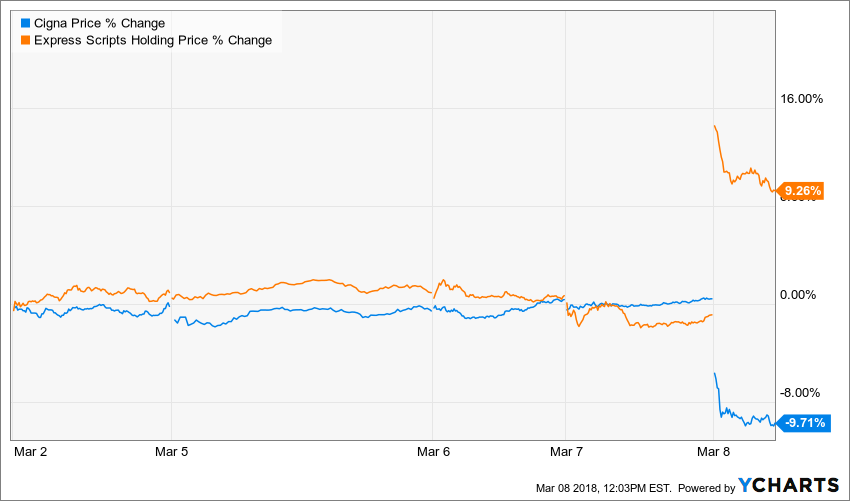Yesterday morning, Cigna CI announced that it will acquire the equity of Prescription Benefits Manager (PBM) Express Scripts ESRX for $52 billion – $54 billion in a combined cash and stock deal and will retire Express Scripts’ $15 billion of debt, bringing the all-in transaction value to $67 – $69 billion (press release, Bloomberg coverage). Cigna is offering to pay a premium of around 30% to take control of Express Scripts’ shares.
We expect the transaction to destroy value, whether it is ultimately approved by regulators or not. If the deal goes through, Cigna will be destroying a good deal of shareholder value by paying too much for an asset fine-tuned to meet the demand environment of the last decade rather than the next; if it does not, Express Scripts will become the best bearish idea around. In our view, Cigna and Express Scripts are swimming upstream against a tide that will only get stronger over the next five years. Cigna executives are right that it is necessary for their company to acquire what has become America’s largest stand-alone PBM. However, necessary is not the same as sufficient, and sufficiency hinges upon what happens in the world of politics and the Fortune 500; both groups have realized that America’s current health provision system does not work in some very fundamental and important ways.
Stock charts for Cigna and Express Scripts tell an interesting story:

Figure 1. Source, YCharts
Clearly, investors perceive the Cigna offer to be value destructive, judging by Cigna’s stock price drop. But it is also clear that Express Scripts’ stock, reacted tepidly to the announcement. This morning, Express Scripts is trading at a premium of only 7.5% over its March 5 price; while 7.5% is a nice move, it is only about a fourth of the move expected considering the premium offered. We think this suggests that the market is doubtful that the transaction will be approved by regulators. In December 2017, CVS announced (NY Times coverage) it would acquire the health insurer Aetna, also for $69 billion. That transaction is still under anti-trust review. If the CVS-Aetna transaction is allowed, another large merger between Cigna and Express Scripts might not be; if the CVS-Aetna transaction is disallowed, another large merger would almost certainly be disallowed as well.
Cigna needs Express Scripts if it is to compete successfully against a combined CVS-Aetna, but even if it is able to compete against an insurance incumbent, neither might be able to compete successfully with new market entrants eager to disrupt the market for healthcare provision in the US. All incumbents in the healthcare provision space took a hit when Amazon, Berkshire Hathaway, and JP Morgan Chase announced they would form a joint venture to provide healthcare to their employees — making an end run around traditional suppliers and insurers. If this consortium and others like it build momentum, traditional insurance providers may be forced to restructure their operations to face competitors that are not operating with a profit motive.
The other possibility is government intervention in the healthcare markets. A political backlash to Republican plans to cut back on Medicare, Medicaid, and the ACA (which is popular among healthcare consumers of all political persuasions as long as the name “Obamacare” is not used) may well bring about a “Medicare for All” style market which would also take deep bites out of insurers’ profits. It would also almost certainly make obsolete the uniquely American business of PBMs, since they are organizations tailored to a healthcare provision system that would no longer exist.
If the Cigna-Express Scripts transaction does not go through, Express Scripts starts to look a lot like the last person standing when the music stops in a game of musical chairs. Framework has published a good bit on Express Scripts, both on Forbes and on our own site’s Articles page. The company also came up in one of our Office Hour interviews with registered investment advisor, Sheila Chesney, who reported on her last visit to the Grant’s Interest Rate Observer Investment Conference.
At the conference, famed short-seller Jim Chanos, founder of Kynikos Associates, talked about Express Scripts as his favorite short investment at the time. While it is almost certain that if Chanos has a dog that it got kicked once or twice yesterday, we did not disagree with Chanos’ valuation of the firm. Express Scripts is losing its biggest client, Anthem, and to add insult to injury, Anthem is poisoning Express Scripts’ well by suing its soon-to-be-former supplier for overcharging for drugs. In addition, Walgreens Boots Alliance WBA made the decision to battle its largest US drug retailer rival CVS Corporation CVS — which also operates a PBM business — not by buying Express Scripts, but by buying a smaller competitor. The Amazon-Berkshire-Morgan consortium announcement simply underscores Express Scripts’ role as a fifth wheel of American healthcare.
In a nutshell, if the Cigna / Express Scripts merger goes through, Cigna is almost certainly destroying value in its purchase. If the deal falls through, Express Scripts is, in our opinion, a dead man walking.
We will put Cigna on our list to do a valuation and provide more commentary and, if appropriate, an investment strategy, to our members as the situation progresses.
